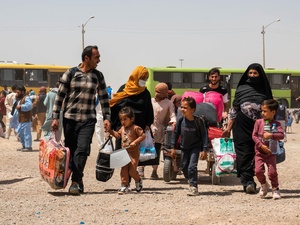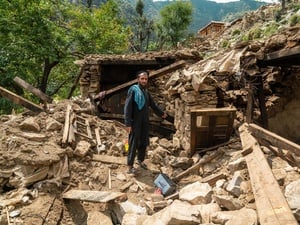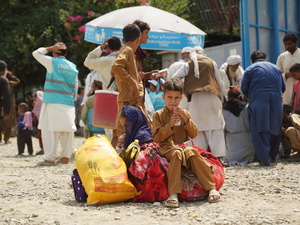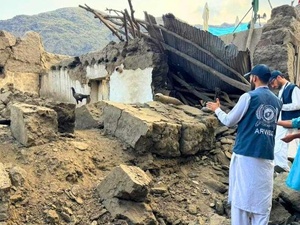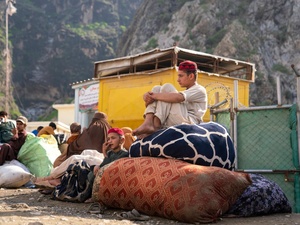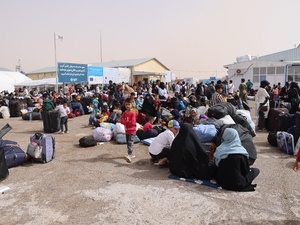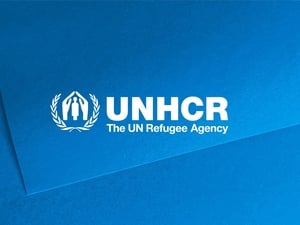Afghan returns from Iran on upswing as Pakistan's numbers wane
Afghan returns from Iran on upswing as Pakistan's numbers wane

Zahedan Voluntary Repatriation Centre in Sisten-Baluchistan province, south-eastern Iran, has seen the largest increase in Afghan registrations so far.
KABUL, Afghanistan, August 20 (UNHCR) - The number of Afghans going home from Iran has risen in recent weeks, with about a third of the total voluntary returns since April in the last month alone. This comes as the pace of repatriation from Pakistan is slowing down.
Sunday's returns following the Islamic state's two-day weekend saw the highest number of Afghans crossing the Islam Qala border from Iran in a single day, with some 5,000 people leaving north-eastern Iran while some 770 more crossed from south-eastern Iran's Sisten-Baluchistan province.
By Monday, as 3,500 Afghans repatriated from Iran, returns topped more than 150,000 people since April, when UNHCR launched its assisted repatriation programme under a tripartite agreement with the governments of Iran and Afghanistan. This is almost 40 percent of the original planning figure of 400,000 returnees from Iran for 2002, established earlier by the UN refugee agency and Iranian authorities.
Returning refugees say Iranian authorities have upped the volume in the country's media in recent weeks, calling on Afghans, particularly those persons who were not documented under a refugee registration campaign, to return home.
"One reason for the increase seems to be rooted in a media effort to encourage people to return before winter sets in," said UNHCR's spokeswoman in Kabul, Maki Shinohara.
Refugees returning to Afghanistan have claimed that they heard Afghans who delay their departure may not continue to benefit from various public services. However, the UN refugee agency has not been officially notified of any policy change.
Many Afghan refugees have been educated in Iran, while the country's hospitals have provided high-quality medical care not available elsewhere in the region.
In Iran's drought-affected Sisten-Baluchistan province, twice as many people have registered to return in the first half of August as during the entire month of July.
Individual men make up 40 percent of the returnees opting to leave under the UN/Iranian initiative. The majority of the people approaching registration centres are documented refugees who are then de-registered before leaving the country, but some 40 percent of the assisted returnees are undocumented Afghans.
All Afghans who opt to return from Iran under the voluntary programme receive transport assistance up to the border for themselves and their personal effects. Once inside Afghanistan, the returnees receive transport assistance of between US$5 and $30 per person, depending upon their final destination. UNHCR gives them plastic tarpaulins, soap and hygienic material, while the UN World Food Programme distributes wheat flour to each family.
To cope with the recent surge, the UN refugee agency has increased manpower to help deal with a backlog of refugees waiting to register at the agency's centre in Zahedan, which handles most Afghans living in Sisten-Baluchistan province. Inside Afghanistan, it has set up another 150 tents in Herat where returnees shelter overnight before moving onwards to their home areas.
Returns from Iran outside the joint initiative continue, the government reports. According to statistics from the Iranian authorities, some 41,000 Afghans have opted to spontaneously repatriate since April. Returns of other categories of Afghans, including forcible returns, have also been reported.
The UN refugee agency maintains that all states must ensure that every individual who may have a claim to asylum should be allowed to have his claim reviewed before being deported to his homeland.
In contrast to Iran, returns from neighbouring Pakistan have slowed considerably, with around 3,000 people going back daily. In response to the declining figures from Pakistan, UNHCR has reduced operations at its largest registration centre at Takhtabaig, outside Peshawar, to four days a week. The once-bustling Pul-i-Charkhi reception centre near Kabul is operating only five days weekly in response to the drop in returnees.
Almost 1.4 million Afghans have returned from Pakistan since the start of UNHCR's assisted repatriation programme in March, in addition to the returns from Iran and more than 9,000 returns from the Central Asian states. With cold weather now less than three months away, returnees and the humanitarian community are in a race against time to ensure that late arrivals receive the aid they need to get through the coming winter.


